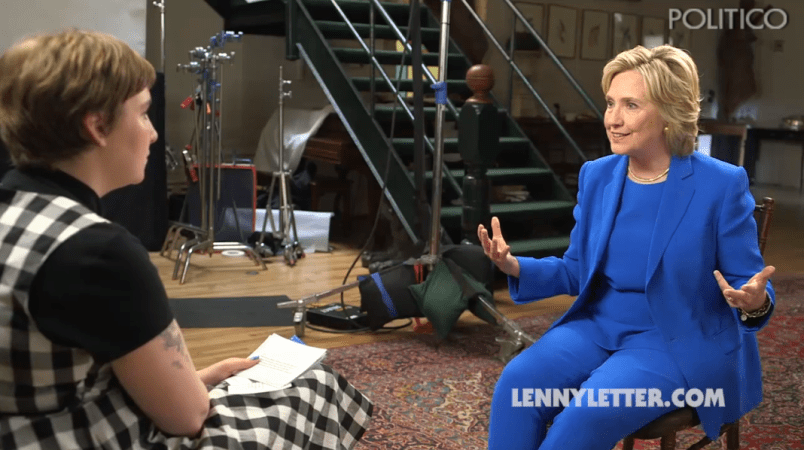Golden Globe winner Lena Dunham’s full interview with Democratic presidential candidate Hillary Clinton’s went live Tuesday as a part of Dunham’s Lenny Letter, a newsletter collaboration with her fellow “Girls” showrunner Jenni Konner.
Dunham and Clinton talked about the former secretary of state’s time as a Goldwater Girl, feminism, student debt and systemic racism. Politico published a preview video Thursday in which Clinton explained why she will always be a feminist.
Clinton, who was criticized earlier this year for her and her husband’s role in the rise of mass incarceration, said the rise of a militarized police forces “sent a very dangerous and threatening message.”
Here’s part of Clinton’s response:
Well, it’s very, very disheartening, because as somebody who did live through the civil-rights revolution, saw the legislation passed that really began to legally end Jim Crow, segregation — all the vestiges that we still live with, it’s very discouraging. However, I will say what I think President Obama has eloquently said: we’ve made progress, but not nearly enough. And we can’t continue to make progress if we’re not even honest with ourselves that we still have problems. One of the areas where we have problems is the relationship between communities of color and the police forces who are to protect them. In those police forces now, we have many more police officers who are from different races, different backgrounds, so it’s not only a question of white versus black. It is a question of how force is used, how our law enforcement are trained, what kind of mind-set they have as they go about their daily jobs.
I think that President Obama’s policing commission, which has issued a report, has some excellent suggestions. For example, after 9/11, we got really anxious to make sure we had homeland security everywhere. And a lot of military equipment was sold to police departments, and those police departments began to look like they were in a war zone, not protecting the family down the block or the neighborhood community center across town. That sent a very dangerous and threatening message.
Read the full interview here.







These suggestions are so good, I just want to read them again and again!
I don’t think an interview with one of the poster children for privilege and racial obliviousness is where you want to demonstrate to Black voters that you understand systemic racism.
Catlin
The last paragraph is a repeat of the second.
This is a good piece. A really nice change of pace from the endless string of meaningless email stories. How did you get it past the editor?
It was a multi-question interview. This was just one of the questions she was asked. What was she supposed to do, say “I’m sorry, but I don’t want to talk to you about that because you are a poster child for privilege and racial obliviousness?”
Who is the poster child of racial obliviousness? Clinton. Well, I don’t think so.